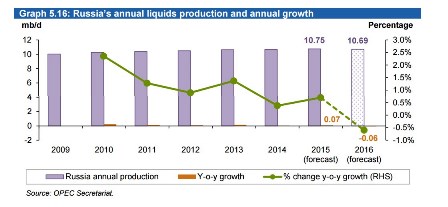www.aljazeerah.info
Opinion Editorials, November 2015
Archives
Mission & Name
Conflict Terminology
Editorials
Gaza Holocaust
Gulf War
Isdood
Islam
News
News Photos
Opinion Editorials
US Foreign Policy (Dr. El-Najjar's Articles)
www.aljazeerah.info
Saudis Planning for a War of Attrition in Europe With Russia's Oil Industry
By Nick Cunningham
Al-Jazeerah, CCUN, November 20, 2015
 |
|
| Annual Russian oil production and growth, 2009-2016 oil price |
Russia's central bank recently warned about the growing
financial risks to the Russian economy from Saudi Arabia encroaching upon
its traditional export market for crude oil. Russia sends 70 percent of
its oil to Europe, but Saudi Arabia has been making inroads in the
European market amid the oil price downturn.
The result is a
heavier discount for Russia's crude oil, the so-called Urals blend.
Bloomberg
reported that the Urals typically lands in Rotterdam, a major European
destination, at a discount to Brent of around $2 or less. But the discount
has widened to $3.50 lately due to increased competition from Saudi
Arabia. "Oil supplies to Europe from Saudi Arabia are probably adversely
affecting Urals prices," the Russian central bank warned in a recent
report.
Russian officials have accused Saudi Arabia of "dumping"
its oil in Europe, a
move that Rosneft chief Igor Sechin said would "backfire."
Russia's economy has been battered by the collapse in crude prices,
compounded by the screws of western sanctions. The Russian economy could
shrink by 3.2 percent this year.
Oil exports account for
around half of the revenue taken in by the Russian government. And for an
economy so dependent on oil, it is no surprise that the plummeting crude
oil price has led to a dramatic
depreciation of
the ruble, although over the past month the currency regained some lost
ground. The weakening currency has pushed up inflation, which creates a
conundrum for the Russian central bank.
To stop the ruble from
plunging further and to keep inflation from spiraling ever upwards, the
Russian central bank took aggressive action by
hiking interest rates to as high as 17 percent at the beginning of
2015. However, that has negatively impacted the economy. As the ruble
stabilized, the bank dialed the interest rate back to 11 percent, where it
stands today.
In response to the tough financial circumstances
that Russia has found itself in, it sees no choice but to squeeze as much
oil out of its aging fields as it can. So far, it has succeeded to some
extent. Russian oil production is expected to rise by a modest 70,000
barrels per day in 2015, averaging 10.75 million barrels per day (mb/d)
over the course of this year. Output hit a post-Soviet record of 10.78 mb/d
in October, according to OPEC's
latest monthly report.
However, the upside to Russia's oil
production is limited. The Russian government needs revenue, so is not
keen to cut taxes. The government is mulling a delay in the planned cut in
export taxes, which, according to OPEC, could result in oil companies
paying an additional $2 to $3 billion more in taxes. That could modestly
cut into overall Russian oil production, perhaps pushing output down by
0.1 to 0.2 mb/d. In any case, Russia probably can't boost output any
further. OPEC predicts Russia's oil production will remain flat through
next year.
Globally, the competition between oil exporters won't
ease in the near term. There are still too many barrels of crude floating
around. OPEC predicts that non-OPEC supply will contract by just 0.13 mb/d
in 2016, a rather trivial amount considering the extreme cut backs in
investment and drilling activity.
Despite the fact that OPEC
officials have consistently put on a brave face in public, insisting that
markets will balance relatively quickly, OPEC's numbers tell a different
story. The cartel sees U.S. shale contracting by just 100,000 barrels per
day in 2016 from 2015, a volume that is nearly offset by several new
projects beginning operations in the Gulf of Mexico.
Which brings
us back to Europe. Saudi Arabia could be playing a longer game,
intensifying its market share strategy by encroaching on Russia's
traditional market in Europe. An increase in Saudi oil flowing to Europe
threatens to undermine Russia's principle market. In its November report,
OPEC reported that the Urals discount to Brent "almost tripled in October
amid plentiful supplies, sagging refinery margins and wide availability of
alternative grades from the Middle East."
Article Source:
http://oilprice.com/Energy/Crude-Oil/Saudis-Planning-For-A-War-Of-Attrition-In-Europe-With-Russias-Oil-Industry.html
Share this article with your facebook friends
|
|
|
|
||
|
||||||


